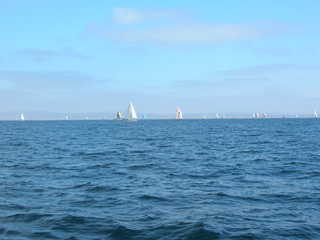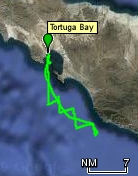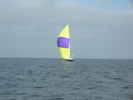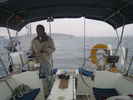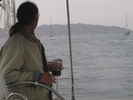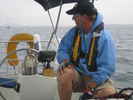False Start to Baja Ha Ha Leg2 and a week in Tortuga Bay waiting for a new Starter motorSaturday morning, Nov 2, 2007, at 6:00 am, we pulled up anchor in Turtle Bay and began to motor slowly out of the bay to the starting line for Leg 2 of the 2007 Baja Ha Ha. We were planning, with the rest of the fleet, to make Bahia Santa Maria by Monday, and then Cabo San Lucas, where crew member Steve was to catch a plane home, by Friday. We were among the first boats out of the bay and answered our place in the roll call and made ready to put up the sails. At about 6:50 am, just 10 minutes before the start, the 1st mate was downstairs and mentioned that she smelled something burning. I gave the helm to Steve and went downstairs, sniffed around a bit, and said it was probably just diesel exhaust and returned to the cockpit to start the race. A few minutes later, just two or three minutes before the race was to begin, as Steve and I were beginning to unfurl the main, the mate called out in an alarmed voice that "I think there's really something wrong." As I descended the stairs, she opened the motor compartment and a plume of smoke emerged. I quickled stuck my head in and could see the bright arc from a short-circut centered in a small two-or-three inch flame. I yelled to Steve to cut the engine, and he pressed the kill switch, but nothing happened ... the motor kept running! I looked a little closer and could see that a bunch of wires had melted on the motor. The plastic insulation was what was burning, giving off an acrid smell. Quickly surmising that the kill switch solenoid or relay was involved in the short circut, I pulled on the lever that releases the pressure in the cylinders and killed the engine, which sputtered to a stop. The arcing continued, so I raced over to the power switch and turned off the engine battery which finally stopped the conflagration. It wasn't immediately clear what had happened, but we could hear on Channel 16 as the countdown to the race was given by a woman in an orgasmic voice: "six ahhh five mmmm foour yeah threeeeee twooooo onnnnneeeeee ahhhhhhh". The race was on and we had a major problem. The next few minutes were kind of hectic. We were wallowing in the water with 150 boats zooming around, so the first thing I said was "lets get some sail up to get the boat under control". number one took the helm and Steve and I pulled out the mainsail and Rhapsody began sailing down course on a slow broad reach.
I went down and felt the engine and it was not particularly hot, but the starter motor was very very hot and covered with melted wires. It was apparent that it was going to take some time to recover the situation, so I went back to the cockpit to let the engine cool a bit and helped Steve pull out half the jib. We might still be able to do the leg if we could repair the motor on the fly. I radioed the Grand Poobah on PROFLIGATE that we had a small engine electrical meltdown and were going to look into it more closely, but were continuing the leg for the time being. I instructed the mate to sail down course with the rest of the boats and that Steve and I would diagnose the problem further. So, while the mate steered a steady course, Steve and I carefully went thru the mass of melted wires, pulling them apart, labelling, and disconnecting them from the starter, the various sensors, and generally, the rest of the port side of the engine. Then we looked at them and decided that, although the insulation was melted, there was still a slim chance that if we re-insulated them and hooked them back up, everything would work. So we spent the best part of an hour carefully applying copious amounts of electrical tape to the various wires and hooked everything back up, discussing each and every wire. It was very reassuring for me to have Steve around, as he manages a Battery Manufacturing Plant in Tijuana and knows gobs about electricity and was able to check my work at every step. After taping everything back up and checking with a volt meter that there was no short between ground and power, we decided to try to start the motor. We turned the power back on to the engine, turned the key, and there was a small spark and nothing else happened so we quickly turned the key and power back off, and I reluctantly made the decision that we could not continue Leg 2. Even though we're a sail boat and theoretically could proceed to Bahia Santa Maria, it is better to have an engine, no discussion needed. I told the crew that we already knew that BSM was a desolate outpost and that Tortuga Bay, with it's bustling community, internet cafe's, auto mechanics, etc, would provide a much safer alternative and better chance to get the problem solved and that, as skipper, I was deciding to turn back. I radioed PROFLIGATE and told them of our decision and they concurred that we were making the right choice in turning back and wished us luck. So, with some sadness, we put Rhapsody over on the other tack and proceeded to beat our way back to Turtle Bay. In the one or two hours since the start of the race, we had made 10-12 miles down course, so we had to sail for quite a while to get back to our safe haven. In fact, it took us about 4 hours to sail into TB and, for the first time ever, drop anchor under sail. We discussed every aspect of this maneauver before performing it, so Steve was ready and backwinded the main with the preventer as I dropped the anchor at about 3:00 pm. We let out extra scope on the rode to compensate for the fact that we did not have a motor to put in reverse to dig the anchor in, but even so, under the conditions, were proud of the way we handled the situation. got the boat back safely, and anchored it. The good news was that now we had Tortuga Bay nearly to ourselves. Where there had previously been 170 sailboats, there were only 5 or 6. By 5:00 it was apparent that we were not going to be able to do anything further that day, so I called for tots and beers and we had a good meal. |
